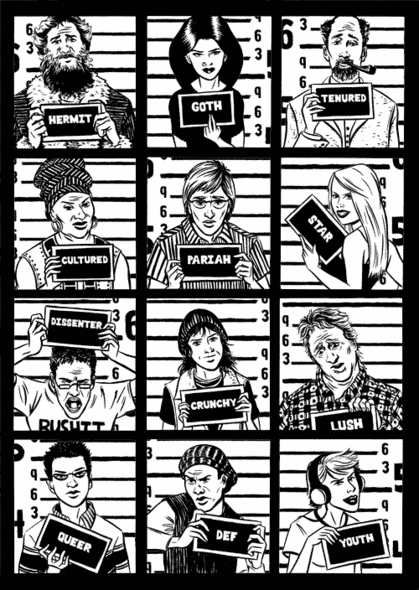Throughout history, if people are slightly different from what is considered the norm, people will label others as something specific, with age (teenagers - drinking, smoking, violence etc), gender (sexual orientation, roles of gender), religious, and cultural (subculture - goth, emo etc) stereotypes being some classic examples of where people are labelled.
Some major examples of labelling and stereotyping are;

2. Teenagers - Considered rebellious, causes of knife and gun crime, irresponsible, under age drinkers. Subgroups - chavs, emos, hipsters, goths etc.
3. Muslims - Post 9/11 = Lots of negative stereotyping surrounding terrorism, people considering every Muslim to be extremists and dangerous.
It seems that when people are different from the norm, society will label these minorities as they may be afraid of these minorities for whatever reason (media exploitation of the subgroup possibly?) and people are unsure of things they aren't so familiar with.
'It is okay to be a feminine man in society now'
I believe that it is deemed for acceptable to be a feminine man in modern day society, with the introduction of pamper days for males (including facials, manicures etc.) and pressure from the media, meaning men want to look better than before.
Even sports magazines, and magazines aimed at males, feature airbrushed pictures of men with perfect bodies, skin and hair, which just like in female magazines, are going to make this look more appealing to men, and males realise that to get this look, they need to take care of their appearance, get manicures and possibly even wear some make up to make them look better.
 In society, we are shown examples of feminine male celebrities, for example, the slightly more extremes such as Pete Burns and Julian Clary, and then male stars such as Will Smith, Hugh Grant and Leonardo DiCaprio, who all embrace male grooming, which deems it more acceptable for the average day man to partake in these kind of things, without being ridiculed.
In society, we are shown examples of feminine male celebrities, for example, the slightly more extremes such as Pete Burns and Julian Clary, and then male stars such as Will Smith, Hugh Grant and Leonardo DiCaprio, who all embrace male grooming, which deems it more acceptable for the average day man to partake in these kind of things, without being ridiculed.
Reality TV programmes such as Geordie Shore, Jersey Shore and The Only Way is Essex could also be considered to have a part in making it okay for males to be more feminine in society now, as a lot of the cast from both of these programmes openly admit to having spray tans, tanning beds, waxing and wearing some make up.
No comments:
Post a Comment